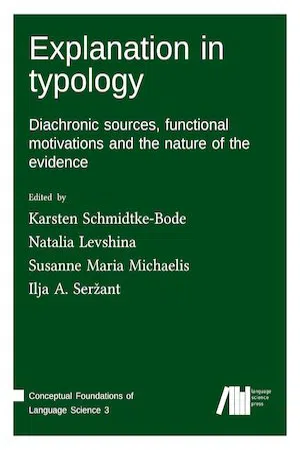
Explanation in typology : Diachronic sources, functional motivations and the nature of the evidence
- English
- PDF
- Available on iOS & Android
Explanation in typology : Diachronic sources, functional motivations and the nature of the evidence
About this book
This volume provides an up-to-date discussion of a foundational issue that has recently taken centre stage in linguistic typology and which is relevant to the language sciences more generally: To what extent can cross-linguistic generalizations, i.e. statistical universals of linguistic structure, be explained by the diachronic sources of these structures? Everyone agrees that typological distributions are the result of complex histories, as "languages evolve into the variation states to which synchronic universals pertain" (Hawkins 1988). However, an increasingly popular line of argumentation holds that many, perhaps most, typological regularities are long-term reflections of their diachronic sources, rather than being 'target-driven' by overarching functional-adaptive motivations.
Frequently asked questions
- Essential is ideal for learners and professionals who enjoy exploring a wide range of subjects. Access the Essential Library with 800,000+ trusted titles and best-sellers across business, personal growth, and the humanities. Includes unlimited reading time and Standard Read Aloud voice.
- Complete: Perfect for advanced learners and researchers needing full, unrestricted access. Unlock 1.4M+ books across hundreds of subjects, including academic and specialized titles. The Complete Plan also includes advanced features like Premium Read Aloud and Research Assistant.
Please note we cannot support devices running on iOS 13 and Android 7 or earlier. Learn more about using the app.
Information
Table of contents
- Contents
- Introduction Karsten Schmidtke-Bode
- 1 Can cross-linguistic regularities be explained by constraints on change? Martin Haspelmath
- 2 Taking diachronic evidence seriously: Result-oriented vs. source-oriented explanations of typological universals Sonia Cristofaro
- 3 Some language universals are historical accidents Jeremy Collins
- 4 Grammaticalization accounts of word order correlations Matthew S. Dryer
- 5 Preposed adverbial clauses: Functional adaptation and diachronic inheritance Holger Diessel
- 6 Attractor states and diachronic change in Hawkins’s “Processing Typology” Karsten Schmidtke-Bode
- 7 Weak universal forces: The discriminatory function of case in differential object marking systems Ilja A. Seržant
- 8 Support from creole languages for functional adaptation in grammar: Dependent and independent possessive person-forms Susanne Maria Michaelis
- 9 Linguistic Frankenstein, or How to test universal constraints without real languages Natalia Levshina
- 10 Diachronic sources, functional motivations and the nature of the evidence: A synthesis Karsten Schmidtke-Bode & Eitan Grossman
- Index